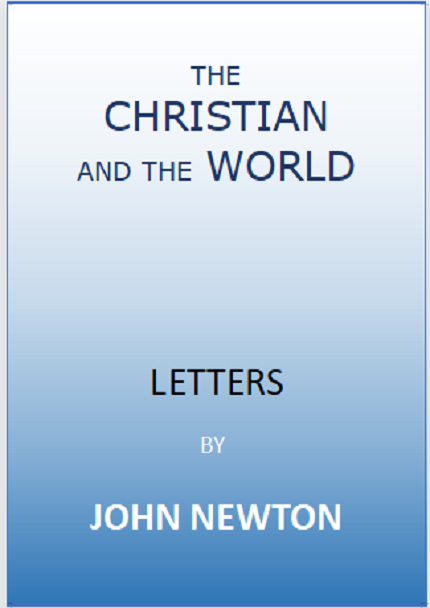Letters by John Newton.

The Christian and the World.
Leters by John Newton.
About John Newton:
John Newton (1725-1807) was an English Anglican clergyman and prominent abolitionist known for his evangelical beliefs. Despite his earlier involvement in the slave trade as a captain of slave ships and an investor, Newton underwent a transformative experience that led him to renounce the trade and dedicate his life to the fight against slavery. He also became a celebrated hymn writer, known for composing “Amazing Grace” and “Glorious Things of Thee Are Spoken.”
During his youth, Newton ventured to sea at a young age and worked on slave ships for several years. In 1745, he himself became enslaved by Princess Peye of the Sherbro people in present-day Sierra Leone. Newton was eventually rescued and returned to sea, resuming his involvement in the slave trade as a captain of various slave ships. After retiring from active seafaring, he continued to invest in the slave trade. However, after a profound religious conversion, he experienced a change of heart and became a fervent supporter of abolitionism.
Ordained as a cleric in the Church of England, Newton served as a parish priest in Olney, Buckinghamshire, for twenty years. He actively participated in the abolitionist movement and used his influence to advocate for the end of the African slave trade. His efforts came to fruition in 1807 when the British Empire abolished the trade, shortly before Newton’s death.
Born in 1725 in Wapping, London, John Newton was the son of John Newton the Elder, a shipmaster, and Elizabeth Scatliff. His mother, raised as a Nonconformist, passed away when Newton was seven years old. After attending a boarding school for two years, he went to live with his father’s new wife in Aveley, Essex.
At the age of eleven, Newton embarked on his first sea voyage with his father. Over the following years, he sailed on six voyages until his father’s retirement in 1742. Initially destined to work on a sugarcane plantation in Jamaica, Newton decided to join a merchant ship bound for the Mediterranean Sea.
In 1743, while on his way to visit friends, Newton was forcibly impressed into the Royal Navy. Serving as a midshipman on HMS Harwich, he faced punishment and demotion to a common seaman after attempting to desert. Enduring humiliation and contemplating extreme actions, Newton eventually recovered. He later transferred to the slave ship Pegasus, which transported goods to West Africa for trade with slaves destined for the Caribbean and North America.
Newton’s time on Pegasus was marked by discord with the crew, leading to his abandonment in West Africa in 1745. He ended up under the control of Amos Clowe, a slave dealer, who then handed him over to Princess Peye of the Sherbro people. Newton endured mistreatment and abuse during his enslavement, referring to this period as his time as “an infidel and libertine, a servant of slaves in West Africa.”
In early 1748, Newton’s father arranged for his rescue, and he returned to England aboard the merchant ship Greyhound, carrying beeswax and dyer’s wood. It was during this journey, while caught in a severe storm off the coast of County Donegal, Ireland, that Newton experienced a spiritual awakening. Praying for mercy, he witnessed the storm subsiding, which marked the beginning of his conversion to Christianity.
Following his conversion, Newton immersed himself in the study of the Bible and Christian literature. He fully embraced evangelical Christianity upon his arrival in Britain on March 10, 1748, a date he commemorated for the rest of his life. Although he continued to be involved in the slave trade for a period, he developed empathy for the enslaved individuals during his time in Africa. Newton acknowledged
Letters in the Christian and the world.:
Contents:
– The christian and the world.
– Combating worldliness.
– A christian’s attainments in the present life.
– What a christian ought to be.
– The advantages of a state of poverty.
– The comforts and snares of social and relative affections.
– Seriously engaged about trifles .
– Enjoyments of the pleasures of the present life.
– On female dress.
– True patriotism!
– On eating and drinking.
– Separated from the ungodly world.